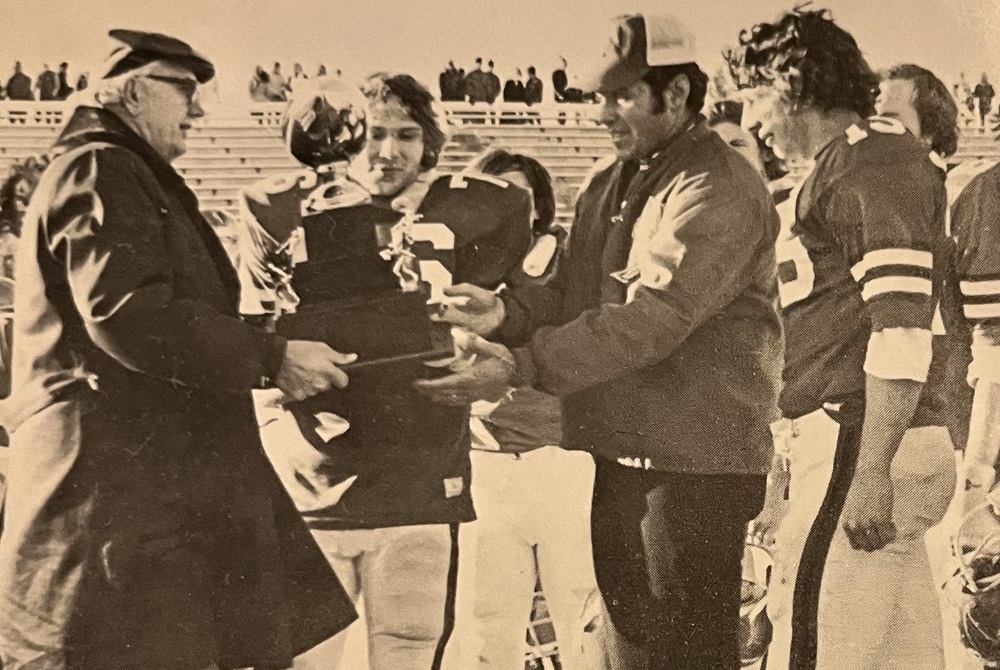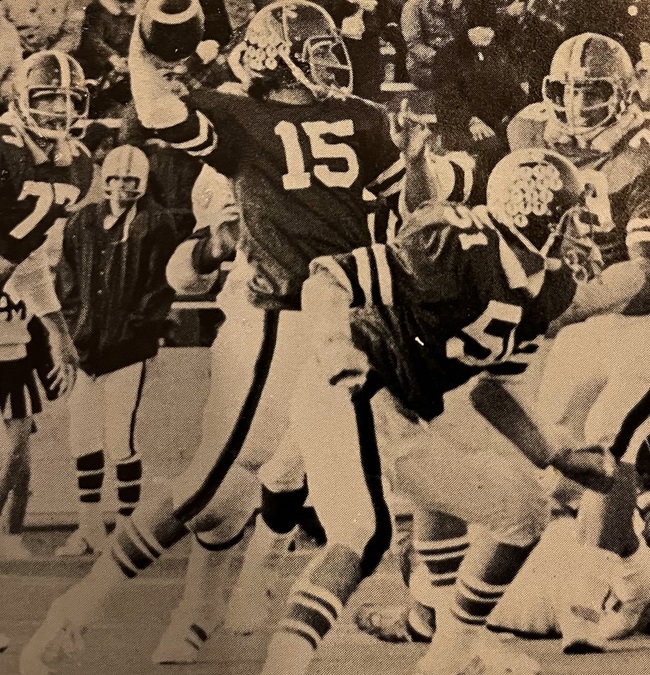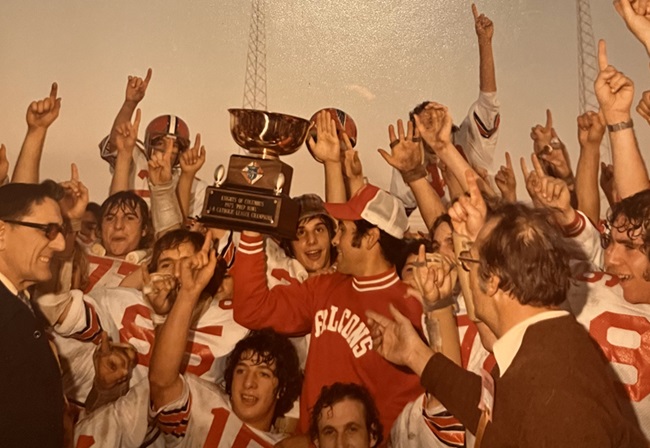
'Oakridge Family' True in Name & Purpose
October 3, 2018
By Tom Kendra
Special for Second Half
Every football team talks about being a family.
 But at Muskegon Oakridge, it’s more than just a motto.
But at Muskegon Oakridge, it’s more than just a motto.
Three of the Oakridge varsity coaches have sons on the team, including head coach Cary Harger with two-way starting senior lineman Cole Harger.
“It does make it extra special, being a senior and playing for my dad,” said Cole Harger of the Eagles’ high-flying start, which has them 6-0 and ranked No. 3 in Division 5 in the latest Associated Press poll.
“The family thing is real out here. This is such a tight-knit community, and we’re just together all the time. We know each other so well and know how to push each other.”
Oakridge faces its toughest test of the season Friday when it hosts conference rival Montague (5-1), which comes in riding a five-game winning streak and ranked No. 10 in Division 5.
Oakridge has been the dominant team for almost 40 years in the West Michigan Conference, a league which has put 14 teams in MHSAA state championship games and celebrated nine Finals winners. Oakridge has made it five times, winning titles in 1997, 2005 and 2008.
Early on in that stretch, the Eagles’ main league rival was North Muskegon, and later Ravenna. In the 2000s, the most competitive rivalries shifted north to the White Lake area in Whitehall and Montague, particularly Montague.
Oakridge is 7-4 against Montague over the past 11 years, with many of those games classic back-and-forth battles that came down to the final minutes (and sometimes, seconds). But the only game that anyone at Oakridge seems to remember is from a year ago, when host Montague pounded Oakridge 40-0 – the most lopsided conference loss in school history.
“We have waited 51 weeks for the opportunity to erase that memory,” said senior linebacker Jaden Parker, whose father, Tim, is the Oakridge defensive coordinator. “We got shell-shocked last year and didn’t fight back. This year we have more seniors, and we won’t let that happen again.”
 This year’s matchup features two of Michigan’s top running backs. Montague senior Bryce Stark, a returning Associated Press all-stater, has gained 542 yards on 74 carries (7.3 per carry), despite being slowed early in the year with a knee injury. Oakridge counters with battering ram junior fullback Leroy Quinn (6-1, 216), the leading rusher in the Greater Muskegon area with 111 carries for 1,119 yards (10.1 average) and 19 touchdowns.
This year’s matchup features two of Michigan’s top running backs. Montague senior Bryce Stark, a returning Associated Press all-stater, has gained 542 yards on 74 carries (7.3 per carry), despite being slowed early in the year with a knee injury. Oakridge counters with battering ram junior fullback Leroy Quinn (6-1, 216), the leading rusher in the Greater Muskegon area with 111 carries for 1,119 yards (10.1 average) and 19 touchdowns.
Coach Harger is quick to point out that Stark is just one of many weapons on this Montague team who worries his team.
“The first thing that strikes you about Montague is their athleticism and the number of quality athletes we have to focus on,” said Harger, a 1990 Oakridge graduate. “But they are also big up front, so you have to be concerned with that, as well. We need to play our best game.”
The final father-son connection on the Oakridge varsity staff is offensive coordinator Nate Danicek and his son, Jacob, a sophomore who starts at safety and plays slot receiver on offense when the Eagles break out of their full-house backfield and go with a spread look.
But the Oakridge football family goes far beyond just the coaching staff – it’s a way of life.
After a long practice Tuesday evening, Coach Harger and Coach Parker (whose fathers coached them on an Oakridge youth football team almost 40 years ago) went down the varsity roster and quickly pointed out all of the players whose fathers also played varsity football at Oakridge.
On that list is senior starting quarterback Koleman Wall (6-3, 197), whose father, Scott Wall, was the starting fullback on the 1990 team, the first Oakridge team to reach the MHSAA title game. Other father-son duos are starting running back and linebacker Blake Masterman (father Dan Masterman), starting center Mavrick McLouth (Dude McLouth), Jacob Barber (Nate Barber) and Sander Brott (David Brott).
Sander Brott is also a third-generation Eagle, as his grandfather, Mark Fazakerley, played on the first Oakridge varsity team in 1966.
“We are doing our best to carry on the tradition that Jack Schugars started out here,” said Coach Parker, referencing Schugars, who had a 262-78 record in 31 seasons at Oakridge from 1979 to 2010. “It’s a point of pride that these are all Oakridge kids. We don’t have schools of choice, so almost every one of these kids has been playing together since the youth leagues.”
The Oakridge youth league still boasts more than 150 players and is the starting point for one of the state’s most consistent programs.
 With its six consecutive wins to open the season, Oakridge has qualified for the playoffs for the 15th straight year and 23rd of the past 24. Many believe this team could be good enough to get all the way to Ford Field for the first time since 2008.
With its six consecutive wins to open the season, Oakridge has qualified for the playoffs for the 15th straight year and 23rd of the past 24. Many believe this team could be good enough to get all the way to Ford Field for the first time since 2008.
The Eagles have an experienced backfield led by Quinn, but also featuring speedy senior Masterman (359 yards) and multi-talented senior Jalen Hughes (315 yards). Wall provides a fourth running threat and has been efficient through the air, completing 28-of-43 passes for 516 yards and 10 touchdowns, with just one interception.
The defense is led by senior tackle Brandon Wilde (5-9, 212), who has 38 tackles on the season with half of those tackles in the backfield for negative yardage, including six sacks. Masterman leads the team with 40 tackles, and senior cornerback Jaxon Fri has three interceptions.
Oakridge could possibly play Montague a second time in the playoffs. Montague has traditionally been a Division 6 playoff team, but with its enrollment up 36 students from last year to 445, it could end up with Oakridge in Division 5.
Another possible Eagles rematch down the road is with top-ranked Saginaw Swan Valley, which beat Oakridge in last year’s MHSAA Regional Final, 48-14.
The “Oakridge family” isn’t looking near that far ahead, but is focused on proving itself after last year’s lopsided loss at Montague.
“The way we played in that game last year was our biggest motivation all offseason,” said Cole Harger. “That wasn’t Oakridge football. I think one of our biggest strengths this year is our togetherness as a team, and we have the opportunity to prove that on Friday night.”
 Tom Kendra worked 23 years at The Muskegon Chronicle, including five as assistant sports editor and the final six as sports editor through 2011. E-mail him at [email protected] with story ideas for Muskegon, Oceana, Mason, Lake, Oceola, Mecosta and Newaygo counties.
Tom Kendra worked 23 years at The Muskegon Chronicle, including five as assistant sports editor and the final six as sports editor through 2011. E-mail him at [email protected] with story ideas for Muskegon, Oceana, Mason, Lake, Oceola, Mecosta and Newaygo counties.
PHOTOS: (Top) Senior Cole Harger and Oakridge coach Cary Harger are one of three sets of fathers and sons on the varsity this season. (Middle) Harger (66), a two-way starting lineman, lines up his block during a Week 2 win over North Muskegon. (Below) Harger, with Jacob Danicek (middle) and Jaden Parker, whose fathers also are on the coaching staff. (Photos by Sherry Wahr.)

'Refuse to Lose' Divine Child Set Tone for Teams to Come with 1st Class B Title
By
Brad Emons
Special for MHSAA.com
November 15, 2024
There was no more conjecture, no newspaper or Associated Press polls to determine the state football champions.
The champion was no longer decided on paper, but out on the field as the MHSAA launched its first playoff tournament in 1975.
Only 16 total teams over four classes were invited to the dance.
And a school with an already a rich football heritage in Dearborn Divine Child proved it on the field with a 21-0 win over Saginaw MacArthur in the Class B title game before 4,000 fans at Central Michigan University’s Perry Shorts Stadium in Mount Pleasant.
In the Semifinals, MacArthur had outlasted Flint Ainsworth, 44-38, as senior halfback Mark Neiderquill rushed for 285 yards and four touchdowns, while Divine Child ousted Sturgis, 20-3.
In the frigid championship final on Nov. 22, the Falcons’ defense held MacArthur’s high-octane offense to seven first downs and 74 yards rushing. They caused three turnovers, with two fumble recoveries and an interception leading to all three of their TDs.
“I thought we could move the ball, but MacArthur was tough,” DC coach Bob LaPointe told the Detroit Free Press.
In the second quarter, Pat Doyle returned an interception 28 yards for a TD, and Mike Surmacz added the PAT for a 7-0 Divine Child advantage.
 “That first interception really got us rolling,” LaPointe said. “Doyle can run the 40 in 4.9 and speed is what made that touchdown. But he got good blocking, too.”
“That first interception really got us rolling,” LaPointe said. “Doyle can run the 40 in 4.9 and speed is what made that touchdown. But he got good blocking, too.”
Two minutes later, Mike Wiacek gave DC another scoring opportunity when he recovered a MacArthur fumble at the Generals’ 24. Nine plays later, senior quarterback Dan Faletti swept right end and scored on a three-yard bootleg for a 14-0 lead.
“The big thing is that they had a good running back that we had to make sure we kept under control,” said Faletti, who went on to play at Eastern Michigan University before a neck injury prematurely ended his career as a sophomore. “We pretty much got the lead, and Bob was conservative. I just remember scoring that touchdown, and my picture made the paper the next day.”
Neither team could move the ball in the third quarter. There were no first downs.
All-stater Mike Svihra then picked up a fumbled lateral in the fourth quarter and ran 10 yards for the game’s final TD.
“It was not a lot of offense; it was a bitter, cold day,” said Faletti, who went on to work for the Department of Defense for 20 years and Ford Motor Co. before recently retiring. “Bob LaPointe ran a conservative offense. We did ball-control, we didn’t put tons of points on the board ... we didn’t fumble the ball. We didn’t throw interceptions.”
The game, ironically, was played on AstroTurf, not on real grass.
“Everyone makes a bit deal of it, but there really isn’t that much difference,” LaPointe added afterwards. “The only thing I regretted about this game was that I could dress only 44 of my 56 players under the rules. It was tough (to) tell the other 12 they couldn’t suit up.”
An 18-12 loss to Madison Heights Bishop Foley during the final regular-season game, spoiling what would have been an undefeated season in 1974, had left the Falcons distraught – but even more galvanized as they made preparations for the 1975 campaign.
The Falcons also changed their offense in 1975, switching to a triple-option attack that LaPointe got from Notre Dame. The offense proved to be good enough for a 9-0 regular season and an MHSAA playoff berth.
“We were an underdog the whole thing, the whole time, we were the underdog in every big game we played in, but we didn’t allow people to beat us,” said Wes Wishart, who coached the linebackers and offensive line that season before taking over the head coaching reins for the Falcons from 1978-95. “We refused to lose, and that was the motto. From ’74 on those group of kids said, ‘We refuse to lose.’ You use that phrase as a coach all the time, but this group of kids lived it. They were the ones that invented it. When things got tight, ‘refuse, refuse, refuse.’ We’re not backing off from anybody. Great group of young men, great players.”
 During the regular season, DC earned victories over highly-touted Flint Powers Catholic (20-14), previously unbeaten Southgate Aquinas (26-12) and Allen Park Cabrini (12-8).
During the regular season, DC earned victories over highly-touted Flint Powers Catholic (20-14), previously unbeaten Southgate Aquinas (26-12) and Allen Park Cabrini (12-8).
That set up a Catholic League Prep Bowl showdown in the final game of the regular season against highly-touted 8-0 Birmingham Brother Rice, which was ranked No. 1 in the final regular-season AP Class A poll.
Although the Falcons were a decided underdog, the AA division champs upended Rice, 7-0, before a packed crowd at Eastern Michigan University’s Rynearson Stadium to snap the Warriors’ 22-game winning streak thanks to Jim Kempinski’s fumble return for a seven-yard touchdown as he snagged the ball in mid-air and never broke stride while crossing into the end zone.
“We played our butts off,” Faletti said. “It was a dog-eat-dog game.”
It was DC’s 11th Catholic League title, but more importantly put the Falcons into the first MHSAA Playoffs against Sturgis in a Semifinal match at C.W. Post Field in Battle Creek.
“I remember everything was brand new; nobody knew what they were doing,” said Wishart, who guided the Falcons to the 1985 Class A crown as their head coach. “Coach LaPointe on Monday had to get the school to get our hotel rooms in Battle Creek.”
Steve Toepper booted a 27-yard field goal for Sturgis to open the scoring, but DC responded with 20 unanswered points.
In the final quarter, DC’s Rick Rogowski scored on a seven-yard run with 9:23 left (after Steve Savini recovered a fumble caused by Joe Wiercioch) followed by a 10-yard TD run by Faletti with only six minutes to go (after Svihra recovered a fumble).
That sent the Falcons into the Final at CMU, where their defense suffocated MacArthur (9-2).
“We kind of ran a special outside zone. We had to quickly change (how) we would defend that. We shut them down,” said Wishart, who spent 50 years in CYO and high school coaching before retiring to live in New York. “There was no doubt, we were more physical than they were. We were blue collar kids. Typical Divine Child kids, hard-working, never give up.
“We believed desperately in defending Divine Child at all costs because we were a smaller school, so we had an attitude that still lingers there today that we all cultivated. We were going to be a physical squad.”
Meanwhile, what made the Falcons special and unique that title season was their “one for all and all for one” attitude.
“Everybody was the same,” Faletti said. “When we went between the lines, we were all equal. As captain, I got to be command as quarterback in the huddle. But off the field we were all equal. We played like 22 seniors. We were ready for this game.”
PHOTOS (Top) Dearborn Divine Child coaches and players receive the Class B championship trophy after winning the inaugural title game in 1975. (Middle) Falcons quarterback Dan Faletti throws a pass during the Final. (Below) Divine Child players and coaches raise their Prep Bowl trophy in celebration. (Championship game photos courtesy of Dearborn Divine Child yearbook. Prep Bowl photo provided by Dan Faletti.)

